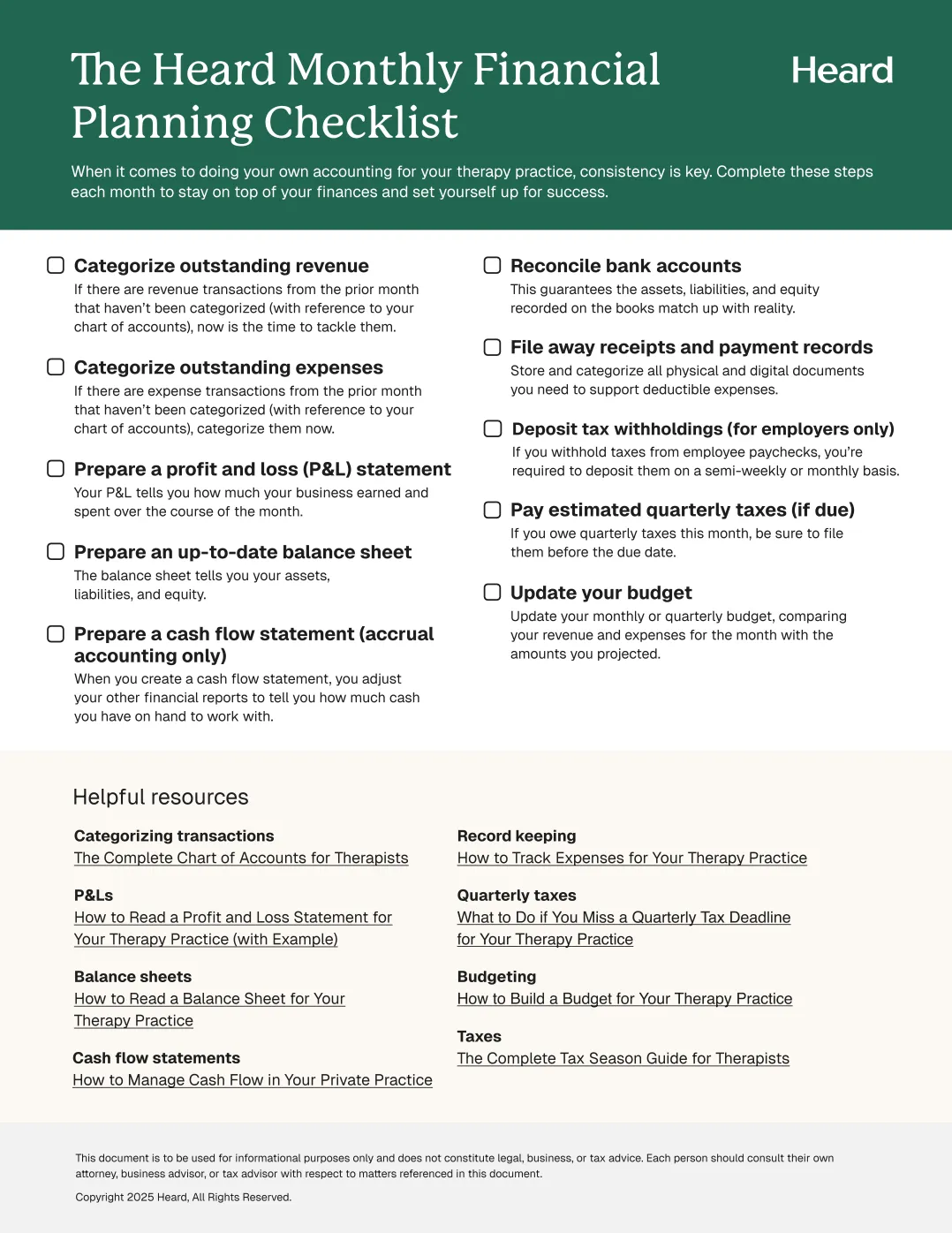“You need to do bookkeeping” is something you’ve probably heard at some point as a private practice owner.
But if you ask how, you usually get blanket statements that aren’t very helpful and don’t give you much direction for next steps.
Before we address if you’re ready to outsource your bookkeeping, let’s talk about what a bookkeeper does.
{{consult}}
What is bookkeeping?
Bookkeeping, by definition, is the process of tracking the financial activity of your business.
In other words, all of the transactions in every bank, credit card, payment processor, and anything else involving money, should be recorded and allocated into a specific category.
Why does this matter so much? Because all those categories will be used for two main purposes: to put together your financial reports and to prepare your taxes.
In addition, every business is required by the IRS to track their finances, although the method (e.g. cash basis vs. accrual) is entirely up to you.
Read more about why bookkeeping is important for therapists.
What is your current bookkeeping process?
Now that we’re clear on what bookkeeping is and why it’s so important, let’s identify where you currently stand on this part of your business.
- Do you have a process in place to track your transactions other than looking at your EHR for revenue and bank balance for expenses?
- If yes, what is that process?
- How demanding or time consuming is that process?
- If you’re doing it yourself, how confident do you feel about the results?
- How frequently are you able to look at your numbers to support your business decisions?
- Does it feel like you’re getting something out of it?
If you don’t have a process in place right now, or you’re feeling overwhelmed by your current process, then it may be time to outsource.
What’s your ideal scenario for your financial systems?
Understanding where you are now, and having an idea of where you want to be gives you the ability to start filling in that in-between that’s currently blank.
Does your best case scenario include being organized for taxes year-round, understanding how well you’re managing your cash, getting a deeper insight into what your numbers mean to you, or having the ability to connect that list of numbers with you, your personal values and goals, and your future?
Does that wishlist include you playing around with spreadsheets, or having someone you trust to ask questions, or a financial team that has your back?
There are endless possibilities. As your own boss and business owner, you actually get to decide what your ideal looks like. As long as you follow the IRS guidelines and stay compliant, you have room to make this process fit your style and preferences, and make adjustments along the way.
If your ideal scenario includes compliance, no surprise tax bills, understanding of your finances, being better at managing your finances, and a team of experts supporting you, you might be in the right moment to look for support from a bookkeeper to front-load the heavy lifting.
- Categorizing your transactions
- Reconciling your accounts to ensure things are correct
- Preparing your financial statements
This process is usually the most time consuming, confusing, and it directly impacts the numbers in your reports. Throw in the mix the fact that you must keep your accounting separate from your client information to stay compliant with HIPAA regulations and things get a lot more demanding.
Therefore, having someone who has knowledge in accounting rather than just a basic understanding of the software is key for the precision of those numbers. Once that first batch of tasks are ready, you’ll be able to show up to your money meetings with the standpoint of a business owner analyzing their cash flow, giving you the ability to make more informed decisions.
{{consult}}
Signs you’re ready to hire a bookkeeper
While every therapy practice has different needs, there are some signs you’re probably ready to outsource your bookkeeping.
- If reviewing your financial statements is not an option or it takes way too much effort on your part
- If preparing your numbers for your taxes feels like a monumental task
- If bookkeeping and finance questions are one of the most common questions you ask your colleagues
- Your Google or YouTube searches are tutorials on bookkeeping and related softwares
- You dread adding up your expenses
- Looking at your numbers makes you question your choices (e.g. “Am I really made to be a business owner?”)
- You want to be better at managing your finances but don’t know how to implement it
- You want to prepare for the future
- You’ve had tax surprise bills that treated your personal savings like an ATM
- You want to feel comfortable when looking at your financial statements
Notice how these are not exactly related to numbers or your ability to do math. In fact, math and money are two separate things. Yes, they involve numbers, but you not being the best in your math class doesn’t automatically make you “bad with money”.
I don’t doubt that you can learn to do your own books, and that you can master this. However, in my experience working with therapy practice owners, what they want to master is their finances, not accounting.
What is stopping you from getting the help you need?
Some of the most common fears I encounter as a bookkeeper are therapy practice owners not wanting to let someone else into their “mess,” letting go of their current methods, or not being in control.
Let’s think about the other end of this practice. By not experiencing a true connection with your finances because of the lack of numbers and reports you’re also experiencing loss and lack of control.
In fact, by positioning yourself in a place where you can be in constant connection with your real financial situation, your sense of responsibility and ownership will solidify even more.
What’s next?
After identifying what your current bookkeeping process is versus your ideal scenario you’ll be able to get a much clearer picture of what that in-between process should look like.
In other words, hiring a bookkeeper to front-load the heavy lifting of your finances journey could potentially be the missing piece to your deeper connection and understanding of your finances, and to make tax season effortless. If you said yes, you’re like so many therapists who have reached out to bookkeepers like me, or companies like Heard.
Together, we can make your practice finances less scary and more valuable.
—
This post is to be used for informational purposes only and does not constitute legal, business, or tax advice. Each person should consult their own attorney, business advisor, or tax advisor with respect to matters referenced in this post.
Andrea is a bookkeeper and the owner of Liquid Cents Bookkeeping. She builds and maintains financial systems for therapy practice owners. She lives with her husband and kids in South Florida.
{{resource}}
Manage your bookkeeping, taxes, and payroll—all in one place.

Discover more. Get our newsletter.
Get free articles, guides, and tools developed by our experts to help you understand and manage your private practice finances.
Heard handles your monthly bookkeeping and provides easy-to-understand reports so you can get a full picture of the money you spend and earn. Schedule a free consult to learn more.
Schedule a free consult




